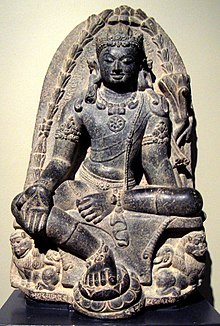Buddhists honor being of supreme wisdom
Buddhists today pay homage to the Manjusri, the bodhisattva of supreme wisdom, depicted with a flaming sword in his right hand to cut through clouds of
 |
| Mañjuśrī Pala Dynasty, India, 9th century CE Source: en.wikipedia.org |
ignorance and a lotus in his left hand symbolizing the attainment of wisdom.
Manjusri, one of the four great bodhisattvas of Chinese Buddhism, is often depicted riding a blue or green lion, representing the use of wisdom to tame the wild and unruly mind. In Sanskrit his name means "Gentle Glory."
Today, the fourth day of the fourth month on the Chinese lunar calendar, is his birthday as a human being. His two other birthdays celebrate his birth as a monk (20th day of the 10th month) dedicating himself to Buddhism and his "birth" (22nd day of the 12th month) as an immortal. Bodhisattvas are enlightened beings who refrain from entering nirvana out of compassion for others.
Today and on other birthdays, Buddhists hold large observances in temples and pray for wisdom. Incense is burned, sutras and prayers are chanted and some believers prostrate themselves.
Some pious believers travel all the way to Wutai Mountain in Shanxi Province, said to be Manjusri's birthplace and his abode. Chanting will continue for two days. Lotus-shaped lamps will be lighted in temples around the mountain.
According to one legend, Manjusri was born from his mother's right rib and at the moment of his birth, the house turned into a giant lotus. He was gold and purple in color and was able to speak the moment he was born.
In another legend, the Buddha himself "created" Manjusri by causing a golden ray to emanate from his forehead. This ray pierced a tree at the foot of the sacred Buddhist mountain, Wutai.
A lotus sprang from the tree and from the flower was born the sage. He was born without father and mother and thus was free of the pollution of the material world.
Buddhist mountain
Though it is difficult to attain wisdom, especially transcendent wisdom, Manjusri is said to guide people to know right from wrong, understand the difference between cause and result and realize the true meaning and value of life. By approaching wisdom, people can avoid being blinded by ignorance and obsessed by worldly desires and follow the path of compassion.
Wutai Mountain, one of the four Buddhist mountains in China, is composed of five peaks, representing the five wisdoms of Manjusri - namely the wisdom of the great round mirror, the wisdom of profound insight, the wisdom of all things equal and universal, the wisdom of perfecting the welfare of self and of others, and the wisdom of nature and dharma.
According to legend, Wutai Mountain was originally a Taoist sanctuary but became a Buddhist haven in the Eastern Han Dynasty (AD 25-220). It is said that two eminent monks from India planned to build temples in the mountain where Manjusri lives, but were blocked by Taoists who were already living their.
The emperor was asked to decide. Both sides agreed to burn religious classics, to identify the real truth. All the Taoist texts were reduced to ashes, while the Buddhist texts were not singed. Buddhism therefore took root and flourished on Wutai Mountain.
Zhang Qian
Source: shanghaidaily.com

